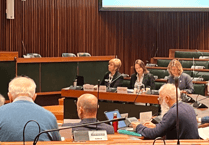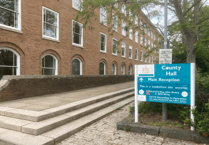FIRE crews will no longer attend automatic fire alarms at certain buildings without a confirmed sign of fire, following changes announced by Devon and Somerset Fire and Rescue Service.
In the last five years to March 2025, automatic fire alarms have alerted the service almost 58,000 times.
On average, only 1.7 per cent of the automatic fire alarms attended by the Service were classed as emergencies, placing an ‘unnecessary burden’ on the service’s resources and ability to be ready and available for genuine emergencies.
The Service consulted with the public, businesses and staff on five options for change.
Having listened to feedback, the service will implement the following changes from November 4: industrial and commercial – 24 hours non-attendance to automatic fire alarms unless confirmed signs of fire; retail and public assembly – 24 hours non-attendance to automatic fire alarms unless confirmed signs of fire (maintaining out-of-term-time cover for schools); residential – phased approach to introduce non-attendance to automatic fire alarms during daytime hours, unless confirmed signs of fire.
Within the residential category, the service will exempt care homes, houses of multiple occupation, and sheltered accommodation, as well as carry out a phased approach, starting with prisons, boarding schools, and hospitals that are not exempt.
Some buildings are already exempt, and we will continue to respond to automatic fire alarms at those premises.
The service will always attend fire alarms at domestic properties and will always respond to a confirmed fire at any building.
The changes extend the policy introduced 12 years ago, when the service stopped attending automatic fire alarms at non-domestic properties during weekday working hours, unless there was a confirmed fire.
Business owners have a responsibility to make sure they have the necessary warning systems and procedures in place.
These changes make it even more important to have a safe way of reporting a sign of fire.
Chief Fire Officer Gavin Ellis said: ‘I’d like to thank everyone who took part in the consultation.
‘Your views have made a difference to the way the changes will be implemented.
‘These changes will help us to keep our fire crews available for real emergencies and prevention work rather than attending false alarms.
‘We will always attend if someone has reported a sign of fire.
‘The changes are only to what we will do in response to an automatic alert, not a report of a fire.
‘We will also always attend single domestic properties, such as houses, or where there is a known night-time sleeping risk’.
These changes are expected to save the Service £178,577.53 a year.
Other benefits include the following:
- Increase in wholetime firefighters’ capacity for training, prevention work, and availability for attending genuine incidents.
- Decrease in road risk due to fewer mobilisations.
- Decrease in fuel consumption leading to potential fuel savings.
- Decrease in carbon footprint due to fewer mobilisations.





Comments
This article has no comments yet. Be the first to leave a comment.